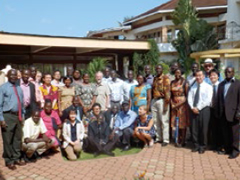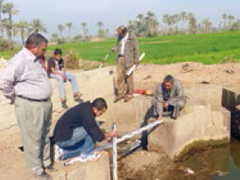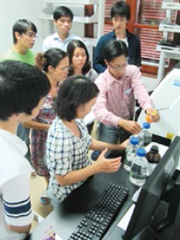Case Study
South Sudan: Project for Comprehensive Agricultural Development Master Plan (CAMP)
Establishing Peace and Promoting Development
South Sudan became independent from Sudan in July 2011. JICA provided support for developing a comprehensive agricultural development master plan for the establishment of peace and promotion of development in South Sudan.
A Milestone of Agricultural Development

The master plan development team, composed of the task team, JICA experts, and donor experts (Photo: JIN Corporation)
Around 95% of the land in South Sudan is suitable for agriculture, and it is said to have an extremely high potential for agricultural development. However, South Sudan is far from meeting domestic demand for food due to prolonged conflicts, drought, and very small-scale subsistence farming. South Sudan remains heavily dependent on emergency assistance and surrounding nations for food; therefore, development of the agricultural sector has been a crucial issue in the country.
For the creation of a master plan, a task team was formed, composed of South Sudan government officials in charge of crop, livestock, forestry, and fishery sectors. They began undertaking tasks with the JICA expert team. Since there was no accumulated information in South Sudan, the team started with a nationwide current-situation survey. After analyzing the possibility and issues of agricultural development, they determined the direction of development policy and then created concrete project plans. These processes allowed government officials to broaden their experience and knowledge, and they now take pride in their own master plan.
The master plan was officially approved at the cabinet meeting in July 2015. As a milestone for agricultural development over the next 25 years, this master plan is expected to improve productivity, to shift the agricultural system from self-sufficiency to commercialization, and to make agriculture a key industry instead of the oil industry. Based on the master-plan documents including the goals above, the South Sudan government and donors will have discussions to ensure steady implementation of the plans.
Peace is essential for the promotion of development, while development cannot be promoted without peace. In this context, JICA continues to provide assistance in carrying out the master plan.
Case Study
Egypt: Project for Strengthening Water Management Transfer
Popularizing Farmer Participation-Type Water Management throughout the Country
For years, JICA has extended assistance to improve the efficiency of water use in Egypt's agricultural sector by utilizing the techniques and knowledge of Japan's farmer participationtype water management.
Efficient Use of Limited Water Resources

Facility survey at a pilot site to check the aging water facility with farmers
Egypt relies on the Nile River for over 90% of its water resources, and the amount of usable water is limited to 55.5 billion tons per year. Due to this, the efficient use of agricultural water, which accounts for more than 80% of Egypt's total water resources, has been a crucial problem. However, in recent years, illegal irrigation and excessive water intake are increasing in tandem with the popularization of irrigation pumps, and irrigation facilities are also deteriorating. It is difficult for the government to control fair water distribution from upstream to farmland, the tail end.
JICA has implemented three technical cooperation projects since 2000 by utilizing the knowledge of Japan's highly evaluated farmer participation-type water management, which is conducted in land improvement districts. In these projects, several water users associations were established and enhanced to appropriately manage water systems, including branch canal and tertiary canals, called mesqa. In this final project, JICA utilized past outcomes and offered capacity-building assistance for the water users' associations and the Ministry of Water Resources and Irrigation (MWRI), which supports the associations. Assistance was also provided for Egypt to develop a road map, which shows a plan to transfer control of the water system to the branch waterway associations over the next ten years.
JICA also conducted flow measurements with the participation of farmers, experiments on a new water-distribution plan that takes the measurement results into account, and joint repair work. These initiatives produced very meaningful outcomes. Accordingly, one of the pilot sites successfully achieved 17% agricultural water saving and reduced the repair cost of water management facilities by 27%. The road map was also officially approved by the MWRI in March 2016 when the project was completed.
In this project, past initiatives that had been supported by various donors since the 1980s finally obtained a consensus from the MWRI for the future vision and strategies. Now it is the time for Egypt to become independent and push forward the water management transfer in accordance with the road map.
Case Study
Viet Nam: The Project for the Development of Crop Genotypes for Midlands and Mountain Areas of North Vietnam
For Production of High-Value-Added New Varieties of Rice Using DNA Information Technology
This project is a Science and Technology Research Partnership for Sustainable Development project to assist the Vietnamese government in achieving its goal of "Developing new highyield varieties of rice using minimal agricultural materials that are resistant to pest damage and with a short cultivation period, and adapting the varieties to Viet Nam."
Preparing to Spread Superior
Lineages throughout the Country

Counterparts at the Vietnam National University of Agriculture receiving a lecture on DNA markers
Based at the Vietnam National University of Agriculture, this project started in December 2010 and continued for five years.
The goal of this project was "Strengthening the rice breeding system to develop promising lines adapting for natural and socioeconomic conditions in the midlands and mountain areas in northern Viet Nam." In order to achieve the goal, the project team developed (1) two lineages whose growing period is ten days shorter than regular lineages, (2) a lineage whose yield is increased by 5–10%, and (3) a lineage that is resistant to pest damage and cold. The new variety in (1) is already being cultivated on 500 hectares of farmland in the north-central part of Viet Nam. Preparations are now underway to spread these varieties throughout the country.
Cultivation and crossbreeding tests were performed in a warm experimental station about 1,300 km south of Hanoi, where the university is located. Thanks to the warm test environment, the project team accelerated the generations of the varieties to three per year, when it usually produces one generation a year in Japan. This advantage greatly contributed to furthering the research.
Utilizing the acquired knowledge and techniques and experience-based know-how, young Vietnamese researchers who participated in this project are expected to continue their research at the Center for International Plant Research Viet Nam/Japan, which was newly established at the university.
Having a variety of social and natural environments, Viet Nam is the epitome of rice cropping in monsoonal Asia. Developing rice varieties suitable for each region in Viet Nam is anticipated to adapt and spread superior lines to rice-growing regions around the world.




scroll